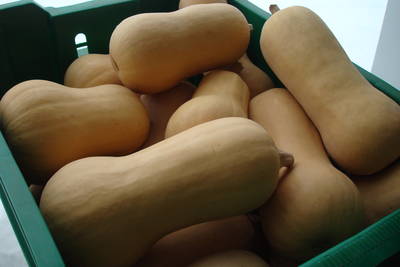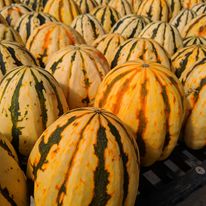Winter Squash



General Information
Winter squash comes in a wide range of colors, shapes and sizes. We grow acorn, Jester, and butternut. Acorn are well known and popular, but the flavor can be hit or miss. Some acorns are delicious, but I find most are rather bland. However, since they are most often served stuffed, people don't usually notice. If you are looking for a more reliably sweet flavorful winter squash I recommend Jester. Use it like you would acorn, but don't add any brown sugar or maple syrup before you taste it. It is sweet enough without added sugar.
The star of the winter squash world is butternut. It stores like a champ and the flavor is always consistently good. Butternuts have a thick meaty neck that gives you a lot of usable squash. Butternuts are equally good used in sweet desserts and savory dishes. They are the variety I use most often and work in most any recipe. If you want to make fresh pumpkin pie, use butternut. Most canned pumpkin isn't what most people think of as pumpkin but a strain called Dickinson Field Pumpkin that resembles, and is more closely related to, butternut.
Storage Information
Store winter squash in a cool, dry place like a back kitchen cupboard or your basement if it isn't too damp.
Cooked winter squash freezes great. Whenever I bake a squash. I always cook as many as will fit in my oven. I then freeze the extra by measuring it out into freezer bags. Be sure to label how much is in each freezer bag and freeze in amounts called for in your favorite recipes. This way you get the most out of your hot oven and save time later. This only works on puree not cubes.
Cooking Suggestions
Cut in half, scoop out seeds, coat with oil inside and out and bake cut side down on a baking sheet lined with parchment paper at 350 for 45-60 minutes, depending on the size. A fork should easily pierce skin when done. You can then eat right out of the skin as a side dish or scoop out flesh for use in other recipes. NOTE for butternut cut the neck off the bottom hollow portion before baking since the neck will take longer to cook.
Winter squash are good filled with your favorite stuffing. Just be sure to cook them as described above before stuffing. After stuffing heat again in oven at 350 until stuffing is heated through.
Peel, cube and steam till soft. Usually about 20 minutes.
Add cubes or puree to soups and stews.
Cube and roast alone or with root vegetables tossed in olive oil and baked at 350 for 40-60 minutes.
Recipes
Baked Rice with Butternut Squash
**Beef Tagine with Butternut Squash**
Black Bean and Butternut Enchilada Skillet
**Black Bean and Butternut Stew**
Braised Winter Vegetable Pasta
"Butter" Chicken Spaghetti Squash Boats
**Butternut and Sausage Soup**
Butternut Squash and Cheddar Bread Pudding
Butternut Squash and Kale Quesadillas
**Butternut Squash and Smoky Black Bean Salad**
Chicken Stew with Butternut Squash and Quinoa
Chickpea and Butternut Squash Curry
Chickpea and Winter Vegetable Stew
Cinnamon Roasted Butternut Squash Spoup
Creamy Gnocchi with Butternut Squash and Spinach
Curried Coconut Butternut Squash Soup
**Curried Squash and Mushroom Soup**
Moroccan Butternut Squash Tangine
Pasta Pan-Fried with Butternut Squash, Fried Sage and Pine Nuts
Pickled Butternut with Sage and Cardamom
Roast Chicken with Potatoes and Butternut Squash
Sausage and Butternut Squash Frittata
**Smoky Butternut with Pasta and Greens**
Spaghetti Squash with Turkey Bolognese
Stir Fried Tofu, Red Cabbage and Butternut
**Stuffed Butternut Casserole**
Warm Butternut and Chickpea Salad with Tahini Dressing
Winter Squash Souffle and Greens